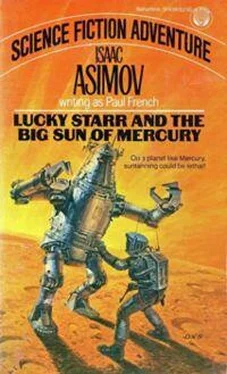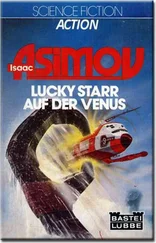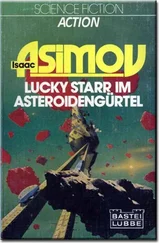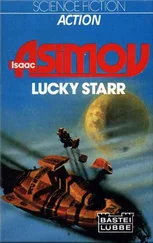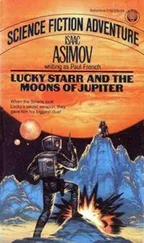Isaac Asimov - Lucky Starr And The Big Sun Of Mercury
Здесь есть возможность читать онлайн «Isaac Asimov - Lucky Starr And The Big Sun Of Mercury» весь текст электронной книги совершенно бесплатно (целиком полную версию без сокращений). В некоторых случаях можно слушать аудио, скачать через торрент в формате fb2 и присутствует краткое содержание. Год выпуска: 1984, ISBN: 1984, Издательство: Ballantine Books, Жанр: Фантастика и фэнтези, на английском языке. Описание произведения, (предисловие) а так же отзывы посетителей доступны на портале библиотеки ЛибКат.
- Название:Lucky Starr And The Big Sun Of Mercury
- Автор:
- Издательство:Ballantine Books
- Жанр:
- Год:1984
- ISBN:ISBN 0-345-31439-5
- Рейтинг книги:4 / 5. Голосов: 1
-
Избранное:Добавить в избранное
- Отзывы:
-
Ваша оценка:
- 80
- 1
- 2
- 3
- 4
- 5
Lucky Starr And The Big Sun Of Mercury: краткое содержание, описание и аннотация
Предлагаем к чтению аннотацию, описание, краткое содержание или предисловие (зависит от того, что написал сам автор книги «Lucky Starr And The Big Sun Of Mercury»). Если вы не нашли необходимую информацию о книге — напишите в комментариях, мы постараемся отыскать её.
Lucky Starr And The Big Sun Of Mercury — читать онлайн бесплатно полную книгу (весь текст) целиком
Ниже представлен текст книги, разбитый по страницам. Система сохранения места последней прочитанной страницы, позволяет с удобством читать онлайн бесплатно книгу «Lucky Starr And The Big Sun Of Mercury», без необходимости каждый раз заново искать на чём Вы остановились. Поставьте закладку, и сможете в любой момент перейти на страницу, на которой закончили чтение.
Интервал:
Закладка:
And then, with no warning, no premonitory glow in the sky, no hint from any atmosphere, there was the Sun!
Rather, there was a hairline that was the Sun. It was an unbearable line of light edging a notch of broken rock on the horizon, as though some celestial painter had outlined the gray stone in brilliant white.
Lucky looked backward. Across the uneven ground that lay behind him there were the splotches of prominence-red. But now, just at his feet, there was a wash of white, catching crystal formations in glinting highlights.
He moved onward again, and the line of light became first a small splotch and then a larger one.
The boundary of the Sun was clearly visible, lifting a bit above the horizon in its center, curving gently down on each side. The curve was awesomely flat to one whose eyes were accustomed to the curvature of Earth's Sun.
Nor did the Sun's blaze drown out the prominences which crawled along its edge like flaming red snake-hair. The prominences were all over the Sun, of course, but only at the edge could they be seen. On the Sun's face, they were lost amid the glare below.
And over all was the corona.
Lucky marveled, even as he watched, at the manner in which the inso-suit had been adapted to its purpose.
A glance at the edge of Mercury's Sun would have been blinding to unprotected eyes, blinding forever. The visible light was bad enough in its intensity, but it was the hard ultra-violet, unfiltered by atmosphere, that would have meant death to vision… and to life itself, eventually.
Yet the glass of the inso-suit's face-plate was so arranged molecularly as to grow less transparent in direct proportion to the brightness of the light that fell upon it. Only a small fraction of a percent of the Solar blaze penetrated the plate, and he could stare at the Sun without danger, almost without discomfort. Yet at the same time, the light of the corona and the stars come through undiminished.
The inso-suit protected him in other ways. It was impregnated with lead and bismuth, not enough so as to raise its weight unduly, but enough to block out ultraviolet and x-radiation from the Sun. The suit carried a positive charge to deflect most of the cosmic rays to one side. Mercury's magnetic field was weak, but Mercury was close to the Sun and the cosmic ray density was large. Still, cosmic rays are composed of positively-charged protons, and like charges repel like.
And, of course, the suit protected him against the heat, not only by its insulating composition but by its mirrorlike reflecting surface, a pseudo-liquid molecular layer that could be activated by a touch on the controls.
In fact, Lucky reflected, when the advantages of the inso-suit were considered, it seemed a pity that it was not standard protection under all conditions. Unfortunately, he realized, its structural weakness, as a result of lacking metal in real quantity, made it impractical for use except where protection against heat and radiation were paramount considerations.
Lucky was a mile into the Sun-side now and not conscious of undue heat.
This did not surprise him. To stay-at-homes who confined their knowledge of space to the sub-etheric thriller shows, the Sun-side of any airless planet was simply a solid mass of undeviating heat.
This was an oversimplification. It depended on how high the Sun was in the sky. From this point on Mercury, for instance, with only a portion of the Sun above the horizon, comparatively little heat reached the surface, and that little was spread over a lot of ground as the radiation struck almost horizontally.
The "weather" changed as one went deeper into the Sun-side and finally, when one reached that portion where the Sun was high in the sky, it was everything the sub-etherics said it was.
And besides, there were always the shadows. In the absence of air, light and heat traveled in a straight line. Neither could reach within the shadow except for small fractions which were reflected or radiated into it from neighboring sunlit portions. The shadows were therefore frosty cold and carbon black though the Sun was ever so hot and bright.
Lucky was growing more aware of these shadows. At first, after the upper line of Sun had appeared, the ground had been almost all shadow with only occasional patches of light. Now, as the Sun rose higher and higher, the light spread and coalesced until the shadows were distinct things hovering behind boulders and hills.
At one time Lucky deliberately plunged into the shadow of a rise of rock a hundred yards across, and it was as though for a long minute he were back on the dark-side. The heat of the Sun, which he had scarcely noticed while it beat upon him, became evident by its decrease in the shadow. All around the shadow the ground glimmered brightly in sunlight, but within the shadow his suit-light was necessary to guide his steps.
He could not help noticing the difference in the surfaces that were in the shadow from those in the light. For on the Sun-side, at least, Mercury did have a kind of atmosphere. Not one in the Earthly sense, no nitrogen, oxygen, carbon dioxide, or water vapor, nothing like that. On the Sun-side, however, mercury would boil in places. Sulfur would be liquid and so would a number of volatile compounds. Traces of the vapor of such substances would cling to Mercury's superheated surface. These vapors froze out in the shadows.
This was brought forcibly to Lucky's mind when his insulated fingers brushed over the dark surface of one outcropping and came away smeared with a frozen hoar of mercury, glittering in his suit-light. It changed quickly into clinging liquid droplets as he emerged into the Sun and then, more slowly, evaporated away.
Slowly, the Sun seemed to be getting hotter. That did not worry Lucky. Even if it grew uncomfortably hot, he could always dodge into a shadow to cool off when necessary.
Short-wave radiation was perhaps a more important consideration. Lucky doubted even that was serious in this short-term exposure. Workers on Mercury had a horror of radiation, because they were continually exposed to small amounts. Lucky recalled Mindes's emphasis on the fact that the saboteur he had seen had remained standing in the Sun. It was natural that Min-des should be disturbed at that. When exposure was chronic any lengthening of the time of exposure was foolish. In Lucky's own case, however, exposure would be short-term-he hoped.
He ran across patches of blackish ground that stood out somberly against Mercury's more general reddish gray. The reddish gray was familiar enough. It resembled the soil of Mars, a mixture of silicates with the addition of iron oxide, which gave it that ruddy tinge.
The black was more puzzling. Wherever it was, the ground was definitely hotter, since black absorbed more of the Sun's heat.
He bent as he ran and found the black areas crumbly rather than gritty. Some of it came up on the palm of his gauntlet. He looked at it. It might be graphite, it might be iron or copper sulfide. It might be any of a number of things, but he would have bet on its being some variety of impure iron sulfide.
He paused in the shadow of a rock, finally, and took stock. In an hour and a half, he estimated he had traveled some fifteen miles, judging from the fact that the Sun was just about entirely above the horizon now. (At the moment, he was more interested in sipping sparingly at the suit's supply of liquid nutrient mixture than in estimating distance, however.)
Somewhere to the left of him were cables of Mindes's Project Light. Somewhere to the right of him were others. Their exact location did not matter. They covered hundreds of square miles, and to wander aimlessly among them in search of a saboteur would have been foolish.
Mindes had tried it, hit or miss, and had failed. If the object or objects he had seen had indeed been the saboteur, there might have been a warning from inside the Dome. Mindes had made no secret of the fact that he was heading out to Sun-side.
Читать дальшеИнтервал:
Закладка:
Похожие книги на «Lucky Starr And The Big Sun Of Mercury»
Представляем Вашему вниманию похожие книги на «Lucky Starr And The Big Sun Of Mercury» списком для выбора. Мы отобрали схожую по названию и смыслу литературу в надежде предоставить читателям больше вариантов отыскать новые, интересные, ещё непрочитанные произведения.
Обсуждение, отзывы о книге «Lucky Starr And The Big Sun Of Mercury» и просто собственные мнения читателей. Оставьте ваши комментарии, напишите, что Вы думаете о произведении, его смысле или главных героях. Укажите что конкретно понравилось, а что нет, и почему Вы так считаете.
